BYD: Charging Ahead into the International Race
With ambitious goals and a clear expansion plan, the Shenzhen-based electric vehicle pioneer BYD is setting new standards. In a groundbreaking move, the company aims to double its overseas sales by 2025—a venture that could not only transform urban mobility landscapes but also significantly impact international markets.
A Leap into Global Territories
Who would have thought a few years ago that a company that originally started as a battery cell manufacturer would become one of the world's largest producers of plug-in electric vehicles? BYD, founded in 1995 by Wang Chuanfu, has successfully made this transformation. Today, BYD Auto is already among the heavyweights in the New Energy Vehicles (NEVs) sector. Last year, 4.27 million vehicles were sold worldwide—a growth that impressively reflects the rising demand for eco-friendly mobility.
The next step in the globalization strategy is as ambitious as it is clearly structured: While 417,204 units were sold abroad in 2024, BYD aims to raise this figure to over 800,000 units in 2025. Markets such as the UK, Latin America, and Southeast Asia are particularly in focus. The brand has already encountered much enthusiasm in these areas—last year, for instance, BYD recorded a sales increase of 658% in the UK, and in Southeast Asia, pioneering impulses are being set thanks to strategic partnerships and new manufacturing sites.
Building Local Capacities as the Key to Success
One of the biggest stumbling blocks on the global expansion path is trade barriers. With high tariffs—around 100% in the USA and Canada, and up to 45.3% in the EU—the import of Chinese vehicles poses a real challenge. BYD is addressing this issue with a clever concept: local production. Several factories are already in planning or under construction on various continents.
In Brazil, for example, a facility in Camaçari is set to start operations in 2025 with an annual capacity of 150,000 vehicles—although the opening has been overshadowed by a labor abuse scandal. A similar chapter is unfolding in Thailand, where a factory in Rayong, capable of producing 150,000 vehicles per year and creating thousands of jobs, is scheduled to open in July 2024. Further plans extend to Europe and Turkey—with a billion-dollar project in Manisa also set to produce 150,000 vehicles annually.
Amid challenges and opportunities, it becomes evident that BYD is not solely relying on sheer export numbers but is also employing a strategy that cleverly navigates local peculiarities and regulatory hurdles. This is complemented by an increased focus on technology: from 2026 to 2027, the company plans to introduce affordable smart driving technologies globally. With DiPilot, a system that utilizes AI and cutting-edge hardware to provide driver assistance systems, safety and efficiency on the roads are expected to advance further.
A Look at the Domestic Scene – or Better: the Numbers
Financial comparisons with industry giants like Toyota show that BYD is already achieving success, even though its profitability per vehicle currently lags behind Toyota's $1,742 at around $1,180. However, Wang Chuanfu is convinced: through enhanced efficiency and better cost control, BYD could not only catch up but possibly even reach the top—a promise that piques the curiosity of both investors and customers.
Particularly impressive is the success in target markets: while in the UK, the market share climbed from 0.17% to nearly one percentage point within a year, BYD is focusing on both buses and cars in Latin America. In Southeast Asia, the company benefits from cultural and economic synergies—partnerships in countries like Malaysia and Indonesia promise additional growth.
A Summary at the End of the Journey
BYD's global expansion plans paint a picture of a company that skillfully balances rapid internationalization with the management of complex local challenges. While success in established markets like the UK and Latin America speaks for itself, investments in modern manufacturing facilities and intelligent driving technology systems are setting the stage for the future.

About Kiara
Author at Autark News
